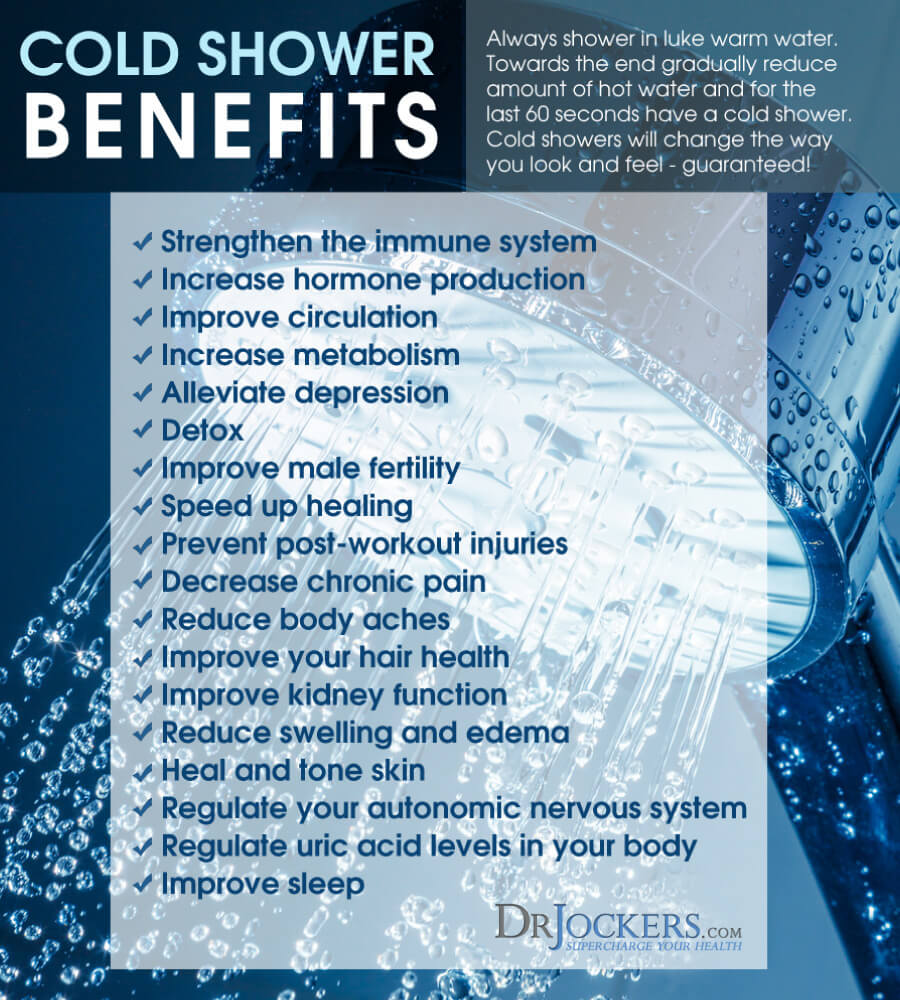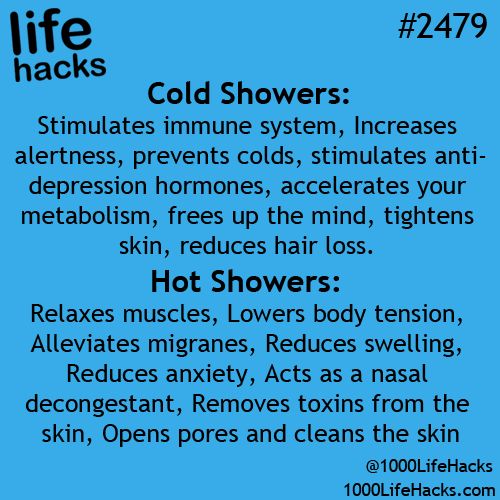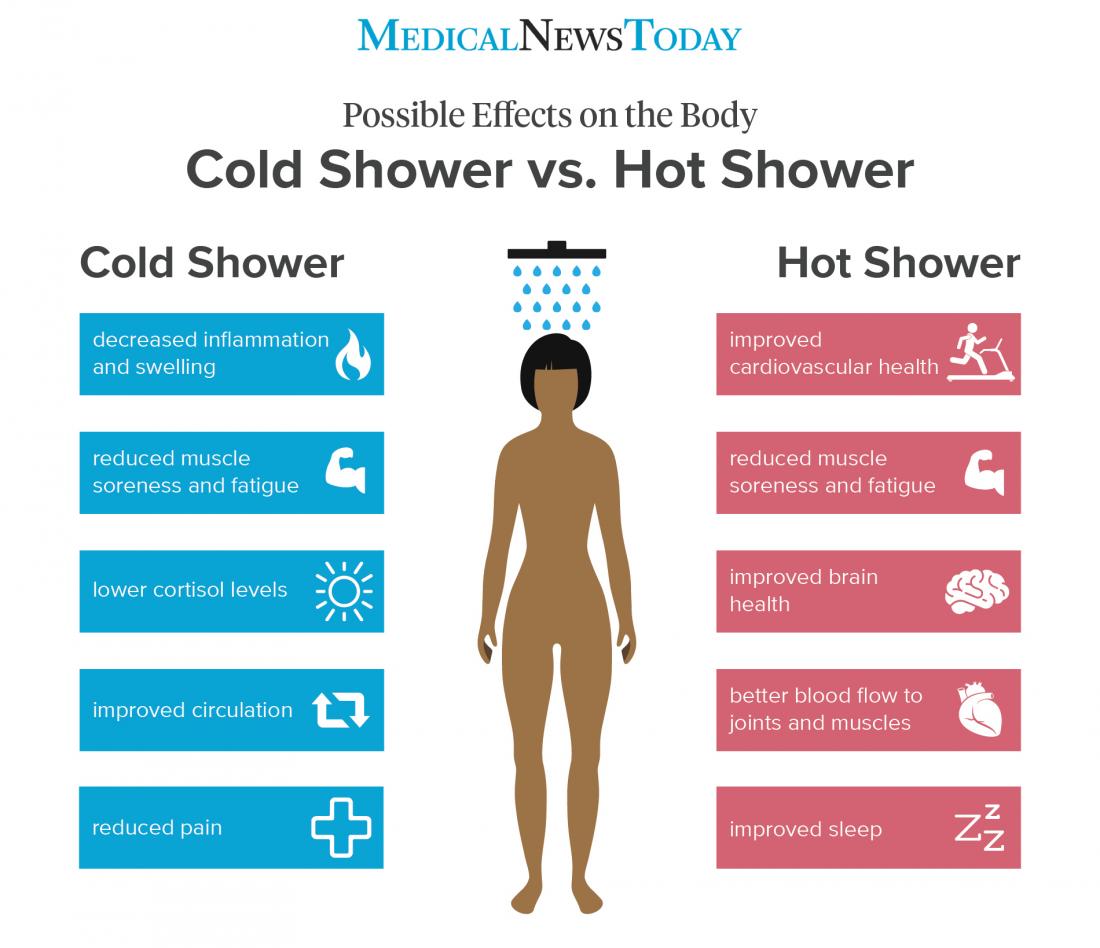What to Know About the Benefits of a Cold Shower vs. a Hot Shower
 Cold Shower Benefits
Cold Shower Benefits
Like most people, you may prefer warm showers to cold ones; however, there may be some tremendous benefits you’re missing out on if so. Showering in 50 to 60 degrees Fahrenheit water is considered a cold shower. Check out the following benefits of taking a cold shower and see if you think it may be worth the effort.
If you’re experiencing breakouts or feel your skin could use a good cleansing, on the other hand, go with a steamy shower!
Improve mental health and boost immunity
Cold showers.
A few years ago, I started occasionally turning down the water temperature for the last few moments of my showers… and about a year ago, I started doing it with every shower I take and at every time of day.
Slowly adding in a minute or two of cold water to your normal shower is a process called tempering…
Tempering is the conditioning process that builds up your tolerance over time through exposure to a stimulus (cold water, in this case) in small, incremental doses. Through this process, your body eventually becomes used to the cold water, and the initial shock from the cold water fades away.
One researcher and practitioner of human limits, Wim Hof – nicknamed The Iceman – is another big fan of cold showers. He considers them the “gateway to flow and energy and peace,” where it’s possible to learn the great power that the mind can have over the body. Hof believes that our bodies achieve their optimal vascular (blood vessel) tone in just 10 days of ending a regular hot shower with a few minutes of cold water.
Turns out, ending your shower on a cold note offers even more health benefits…
Although taking a cold shower may not be a pleasant experience, it can provide certain health benefits. One 2014 reviewTrusted Source, for example, suggests that cold water can:
- decrease inflammation and swelling
- decrease muscle spasms
- have pain-relieving effects
An older study, this time from 2000Trusted Source, investigated the effects of different water temperatures on bodily reactions. In the cold water condition, the researchers submerged participants in 57.2°F (14°C) water for 1 hour. The participants experienced the following effects (some of which may not necessarily be beneficial to health):
- increased metabolism
- increased heart rate and blood pressure
- increased levels of the neurochemicals dopamine and norepinephrine
- lower levels of cortisol, the “stress hormone”
Some beneficial effects of cold water immersion include:
Improved circulation
Exposure to cold water causes the blood vessels on the surface of the skin to constrict. This diverts blood flow away from the surface of the skin. In fact, one small 2019 study found that taking a cold shower after exercise may improve general hydration by cooling down the body.
As blood travels away from the skin, blood vessels in deeper body tissues dilate. This improves circulation in the deeper tissues.
Lower cortisol levels
Cortisol is the “fight-or-flight” hormone that the body releases in response to stress.
Lowering cortisol levels in the blood may therefore help reduce stress levels. ResearchersTrusted Source note that when people immerse themselves in a bath of cold water, their cortisol levels drop.
Reduced pain
According to a 2014 reviewTrusted Source, cold water exposure triggers an automatic pain response called stress-induced analgesia (SIA).
SIA is a reduced pain response during or following exposure to a stressful stimulus, such as cold water immersion.
Reduced sports-related muscle soreness and fatigue
One older study from 2009Trusted Source tested the effects of cold water immersion on physical performance among athletes. Following sports, some of the athletes received cold water immersion, while others received tepid water immersion.
The researchers did not find any differences in subsequent physical performance between the two groups, nor did they find any differences in the amount of muscle damage or inflammation the participants experienced.
However, perceptions of muscle soreness and general fatigue were significantly lower in the group that received the cold water immersion. This psychological effect could prove beneficial during competitive sports.
The muscles in your body may feel tense after a long day, and entering a warm bath or hot shower can help you relax, soothing your body as it soothes your mind. Jumping in the shower a couple of hours before bed can actually help you achieve better sleep. Additionally, getting clean before crawling under the cover will reduce the buildup of germs, dirt, sweat, and body oils that can accumulate on your bedding over time.
Best Temperature for Showering
Getting into a cold shower is never a pleasant experience, but there are a few health benefits you may gain from braving the experience. Cold showers can help reduce inflammation, relieve pain, improve circulation, lower stress levels, and reduce muscle soreness and fatigue. Hot showers, meanwhile, can improve cardiovascular health, soothe stiff joints, and improve sleep.
Understanding when to take a hot or cold shower is essential. Both deliver incredible potential health benefits and can affect your body differently. People with arthritis, for instance, may benefit more from a warm shower in the morning than a cold one because the water is easier on their bones and allows them to experience increased mobility. However, an athlete who suffers from a sports injury might benefit from a cold shower that could help reduce inflammation.
Avoid taking showers that are too cold or too hot, which may harm your health. Knowing the type of effect you hope to achieve or the benefits you’d like to gain from showering before deciding where to turn the shower nozzle is important. In the future, this helpful guide can assist you in determining whether you should take a cold or hot shower.
A hot shower offers your body’s tissues and systems a chance to dilate and expand in size (swelling) – the same way heat allows molecules to expand and speed up (think water turning to steam). A cold shower allows your tissues and systems to tighten and slow down (think water turning to ice).
When you take a cold shower, your blood vessels constrict and blood flow to the chilled areas of your body is reduced. In this way, cold water helps with inflammation, swelling, and pain.
Turns out, cold water also redirects blood flow from the blood vessels near the surface of your skin to the ones deep within your body. In doing so, internal inflammation and swelling in the body goes down and the amount of blood that travels back to your heart increases.
When more blood gets pumped back to your heart, the waste products in your blood are removed and are replaced by nutrients for your muscles much faster. This change is called improved venous return. You can see this life hack and method being used by professional athletes who use cold (even ice) water baths to recover quickly from strenuous exercise.
A small 2016 study tested the effects of cold-water immersion on muscle recovery following knee flexion and extension exercises. The researchers found that the group who experienced the cold-water bath – as opposed to those who had no post-exercise intervention – had less oxygen taken from their muscles after exercising (a normal process of recovery) and reported less soreness the day after exercising. This was thought to be the result of their improved venous blood return caused by the cold water.
Improved venous return also means improved circulation. Not only do our recovering muscles get the benefit of oxygen- and nutrient-rich blood, but so too does the rest of our body (our organs, for example).
Cold showers also reduce our levels of a hormone called cortisol, which directly contributes to our experience of stress. In one study, researchers found that cold water immersion led participants to experience reduced levels of cortisol. They also found that participants in cold water around 57.2 degrees Fahrenheit had an increase in their metabolic rate (the rate at which our bodies expend energy or burn calories) of 350%.
If you want to try cold-shower tempering, do what I do and try this health experience by turning the cold water on for 20 to 40 seconds at the end of your hot shower. It doesn’t have to be ALL the way cold, but it should be quite cool…
Start doing this at the end of every shower (at least five times a week). After week one, add 10 to 20 seconds onto your time. When you’ve finished your week of 40 seconds in the cold water, add on another 20 to 30 seconds… and so on. I actually slowly rotate while I’m doing it so my forehead, then a shoulder, and then back, my other shoulder, and so on get the cold water.
Eventually, your body will get used to the cold water and it won’t feel like such a shock to your system. In fact, recently I’ve hit full cold on the knobs and my body was seemingly still warm post workout and wanted even more cold.
Maybe next year I’ll try swimming in ice like Wim Hof. I’ve easily worked my way up to four minutes of cold-water immersion after my regular hot shower and I’m certain you can as well. I’m already looking forward to this year’s Alliance conference where you can tell me how much you enjoyed it.
Benefits of hot showers
Hot showers may also have beneficial effects for health. Some examples of the potential health benefits include:
Improved cardiovascular health
As one 2014 reviewTrusted Source of hydrotherapy notes, warm water bathing appears to improve blood flow in people with chronic heart failure. This is due to a natural widening of the blood vessels when exposed to high temperatures.
A 2012 study explored the effects of warm water immersion on arterial stiffness, which occurs when the arteries within the body become less flexible. Arterial stiffness plays a major role in the cardiovascular condition atherosclerosis, which can lead to high blood pressure.
The study found that participants who submerged their feet and lower legs in warm water for 30 minutes showed reduced arterial stiffness. Participants who did not receive warm water immersion did not show this effect.
Improved muscle and joint health
As mentioned above, hot showers can enhance blood flow, helping soothe stiff joints and tired muscles. Cold showers, meanwhile, can reduce inflammation and help numb pain.
One 2017 studyTrusted Source investigated the effect of hot and cold therapies on knee osteoarthritis. The researchers divided 96 participants into three groups. A control group received only standard osteoarthritis treatment. The two other groups received standard osteoarthritis treatment along with either heat therapy or cold therapy.
The heat therapy group applied heat to the affected knee twice daily for 3 weeks, while the cold therapy group applied cold to the affected knee twice daily for 3 weeks.
At the end of the study, both groups showed a mild reduction in pain and a mild improvement in knee function. However, these effects were not significantly stronger than those the control group experienced.
Improved brain health
One 2018 study investigated the effects of hot water immersion on brain-derived neurotrophic factor (BDNF). BDNF is a protein that has several important functions in the brain and spinal cord, including:
- promoting the survival of nerve cells
- promoting the growth, maturation, and maintenance of nerve cells
- promoting learning and memory
The study was small, involving just eight men. One group took a 20-minute bath in hot water with a temperature of 107.6°F (42°C). The other group took a 20-minute bath in warm water with a temperature of 95°F (35°C).
Participants who took the hot bath had significantly higher BDNF levels. The researchers concluded that hyperthermia induced by the hot bath increased the production of BDNF.
Improved sleep
Organizations such as the National Heart, Lung, and Blood InstituteTrusted Source recommend taking a hot shower or bath before bed as a way to improve sleep.
A hot shower may improve sleep quality due to the combination of how the body relaxes while bathing and the fall in body temperature afterward.
Doctors sometimes recommend heat or cold therapy for people with muscle or bone injuries. However, it is not yet clear whether or not a cold or hot shower has the same benefits as applying an ice or heating pad.
Some people with arthritis enjoy hot showers in the morning because it helps them feel mobile. However, cold showers are beneficial for injuries accompanied by inflammation.
For taking a hot shower to improve sleep, a 2019 study found that the best time to take a shower or bath was 1–2 hours before sleeping.
People with eczema and other rashes should avoid hot showers altogether, as these can further dry out the skin.


